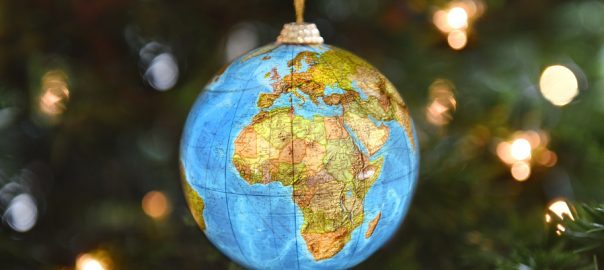
Winter Holiday Traditions from Around the Globe
Winter Holidays, Traditions & Celebrations from Around the World
All over the world, people from all walks of life are anticipating the upcoming winter season and all the festivities and celebrations that it brings. We’ve always been fascinated by the wide variety of holidays and traditions that take place in different cultures, and the stories of how they have evolved in to the celebrations that we know today.
While the customs, rituals, and traditions vary greatly from culture to culture, the underlying themes of love, family, and friendship are common. It’s no wonder why the winter season is called the most wonderful time of the year!
In this article, get ready to take a festive trip around the globe as we explore some of these many holidays and what they mean for those who celebrate them.
Winter Solstice
Perhaps the oldest of the winter holiday traditions, the Winter Solstice has been celebrated for thousands of years in different ways all around the world. This event is centered around the day of the year where the night reaches its maximum duration and darkness, signifying for many cultures a time of rebirth and renewal.
Winter solstice traditions are extremely varied and take on many different forms. In Austria and other parts of Europe, one of the main figures in their celebrations is Krampus, which can essentially be described as the opposite of Santa Claus. Krampus is a mean, nasty demon who terrorizes children. In fact, the traditions and rituals around Krampus would be more akin to Halloween festivities in the eyes of most North Americans, but like many other traditions, are all in good fun.
The Hopi first nations tribe in Arizona celebrates the winter solstice with many rituals and celebrations to welcome protective spirits known as ‘kachinas’. Their traditions include dancing, purification rituals, and occasionally involve the giving of gifts.
Saturnalia is the winter solstice celebration that originated in Rome, and involves banquets and feasts, masquerades, the exchange of gifts, and the forgiving of grievances and grudges. Saturnalia was a time of indulgence and excess, and pretty much everything else was put on hold, including wars.
Of course, these are just a small sampling of the many different ways winter solstice is celebrated around the world. As you may have noticed, many of the historical celebrations associated with winter solstice have similarities and connections to modern festivities, such as gift giving and large feasts with family and friends. It’s not unusual for families to have borrowed or personalized other elements of these holidays and merged them in to their own family traditions that have been passed down throughout the generations.
Kwanzaa
Many people are not aware that the holiday known as Kwanzaa is a relatively recent creation, getting its start in the 1960’s. Kwanzaa was created as a holiday celebration focused around African heritage and pride, and harkened back to traditions in Africa that took place around the first fruit harvests.
Some of the notable symbols of Kwanzaa celebrations include an arrangement of seven candles that signify the seven main tenets of the holiday, and the decoration of homes with colourful art and fresh fruits. Music, food, and drink are all shared as part of the Kwanzaa festivities with friends and family. The proper greeting associated with this holiday is, ‘Joyous Kwanzaa’.
Hanukkah
The traditional Jewish holiday of Hanukkah has an extensive history and dates back to events that took place around 160 BC. At a time when Jerusalem was under the control of Syrian king Antiochus, a rebellion took place and the victorious Jewish people, led by the Maccabees, reclaimed the holy city. During the rededication of the Second Temple, a miracle is said to have occurred. The temple menorah was lit with only enough oil to burn for one day, and yet the lights continued to burn for eight days. Inspired by this wonder, an annual eight-day celebration was instituted to honour the events and remember the miracle.
Hanukkah is celebrated in many ways, including feasts of traditional Jewish foods such as latkes, the exchange of gifts, games and festivities with friends and family, prayer and visitations to Jewish temples. The most well-known part of Hanukkah traditions is the lighting of a menorah, signifying the memory of the miracle of the oil.
Diwali
Diwali is a festival of lights that occurs in the winter months and is celebrated by Hindus, Sikhs, Jains, and Newar Buddhists. Diwali is a spiritual event focused around the triumph of light, good, and knowledge over darkness, evil and ignorance. It is celebrated as a five-day festival, including feasts, artistry, decoration and adornment of homes, gift exchanges, prayer, and the honouring of family bonds and relationships.
One of the traditions associated with Diwali is the creation of artistic patterns known as Rangoli. These intricate designs are created on the floor and consist of colourful powders or sand, arranged in precise traditional patterns, with the intent of bringing good luck.
New Year
For many cultures, the arrival of the New Year is cause for great celebration. Similar to the advent of the winter solstice, the coming of the New Year is seen by many as a time of renewal and rejuvenation. Of course, the celebration of the New Year doesn’t always fall on the same date, since there have been multiple different calendars used in the world throughout history. The Gregorian calendar, which is the calendar most widely adopted in the modern world, and the traditional Chinese calendar mark the New Year at different dates. Since both calendars were developed using different methods of calculating the various increments that divide a typical year, their New Year’s do not align, and as such the time between the celebrations changes each year.
For the majority of revelers, however, the celebrations are quite similar in many ways. Parties, dancing, music, fireworks, and gathering of friends and family occur all over the world to remember the year past and usher in the arrival of the New Year.
Christmas
In North America and many other places in the world, the most well-known and widely celebrated winter holiday is undoubtedly Christmas. This annual celebration takes place in honour of the birth of Jesus Christ, and has evolved over many centuries to include a diverse range of traditions and rituals connected to regional or local beliefs and cultural influences.
Popular elements of Christmas celebrations include large gatherings of friends and family, the exchange of gifts, colourful decorations including colored lights and exterior home adornments, and the trimming of the traditional Christmas tree. For many, a large part of Christmas revolves around the spirit of St Nicholas, commonly known as Santa Claus, whose origin can be traced to northern European cultures. Santa takes flight on Christmas Eve every year and brings gifts to children all over the world.
Other popular aspects of Christmas include a feast with friends and family, and many festive holiday gatherings & activities throughout the days leading up to December 25th. For great low carb recipes & helpful tips for making a healthy Christmas dinner the low carb way, check out our Guide to a Low Carb Christmas.
The Important Role of Food
A common thread that you will likely see running through all of these different holidays is the prevalence of feasting and traditional foods as a key element of the celebrations. This makes sense, of course, since we tend to have very strong emotional reactions to foods, especially when aspects such as nostalgia and religion connect them to our beliefs and values with powerful stories and past experiences.
Here at The Low Carb Grocery, food is our passion. This is why we love to learn about how food plays such an important role in the holidays and traditions that bring us together in celebration with family and friends every year.
We certainly hope that you’ve found this article interesting, and wish you all a very Happy Hanukkah, Joyous Kwanzaa, Merry Christmas, and wonderful time celebrating any of these or other holidays this season!






